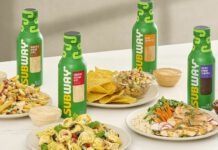The rise of mobile ordering and the use of third-party mobile apps, such as SkipTheDishes and UberEats, has undoubtedly changed the restaurant industry. As other companies make their mark in this space, operators have had to adjust the way they focus on service and ambiance, while considering how speed and convenience will ultimately impact their bottom lines.
According to research from the NPD Group, restaurant digital orders have grown by an average of 23 per cent per year since 2013 and are expected to triple by the end of 2020. Delivering Digital Convenience found that 70 per cent of a restaurant’s digital orders come through its mobile app or website, with the remaining orders coming through third-party apps or websites. What’s more, a report from PayPal reveals Canadians spend up to $2,500 annually for everyday tasks such as food and grocery delivery.
Virtual restaurants are thriving with the rise of third-party apps. Uncle Smoke Cookhouse — a virtual-restaurant serving barbecue and fried chicken in Toronto — is one of those operators. Opened in 2015 by Aidan Galligan and Chris Patheiger, the authentic Southern wood-fire-barbecue concept started in Kensington Market before opening a delivery-only bricks-and-mortar location on Dundas Street West. Through a partnership with UberEats, the business has been able to limit its overhead in terms of labour and material costs, while focusing on gaining market share in the UberEats pool.
“We were running a dark kitchen and were opportunistic [about] partnering with UberEats to sell our food for us,” Patheiger says. “We realized there was enough demand for our product [to eventually operate multiple brands using the same space]. There was a built-in audience that we could take the investment and calculate pretty clearly that if we built a bricks-and-mortar location, we’d be able to sustain it using platforms such as Uber to drive our growth and provide a base of operations for us.”
Due to the success of Uncle Smoke, the company’s planning to launch other concepts using its current facilities.
For bricks-and-mortar restaurant groups such as Kitchener, Ont.-based Charcoal Group, the proposition of third-party apps drawing customers isn’t as palpable.
For Jody Palubiski, CEO of Charcoal Group, it’s all about the dining experience and the fanatical attention his staff pays to the environment. Like many in the industry, The Charcoal Group — with 13 restaurants under its banner — depends on beverage sales and side-value items to drive business and have doubled down on telling customer-experience stories to promote its establishments.
“You’re taking business away from yourself long-term and you’re using up your share of occasions with very little margin — and not thinking about the evolution or how your business will change,” Palubiski says. Sure, you could place a mobile order from one of his restaurants on a Tuesday, but on Saturday, he says that same customer likely won’t come into the restaurant and spend on the things that make his business profitable.
Winnipeg-based SkipTheDishes maintains its goal is to bridge the gap between what a business is already doing, while growing its market share in the areas it serves. With new trends in delivery being fuelled by rapidly changing customer preferences and behaviour, there are opportunities for both customers and restaurant partners to grow alongside these changing trends.
“Food delivery isn’t just for special occasions anymore, but part of having a modern lifestyle,” says a spokesperson from SkipTheDishes. “It’s a unique way to capitalize on the growing consumer trend towards delivery; the increased demand for online food delivery creates the opportunity for delivery-only kitchens [and other operators] to thrive.”


















